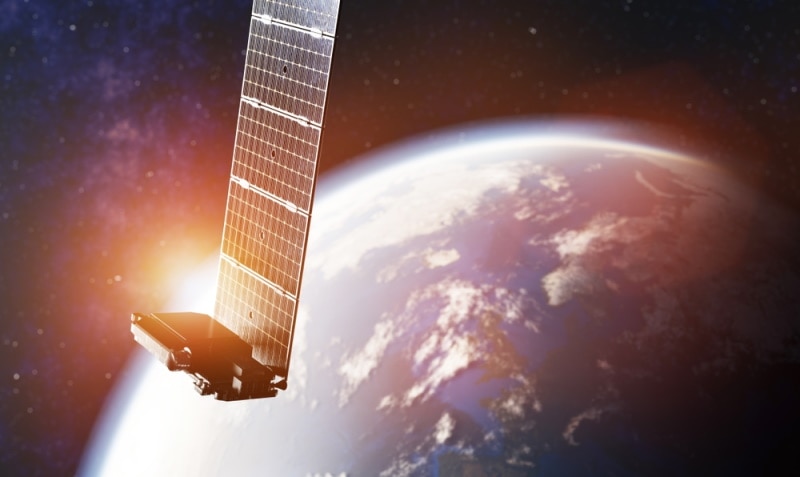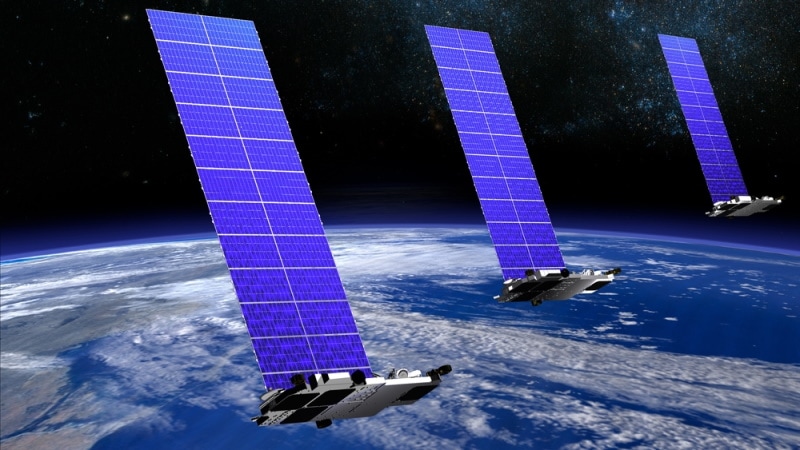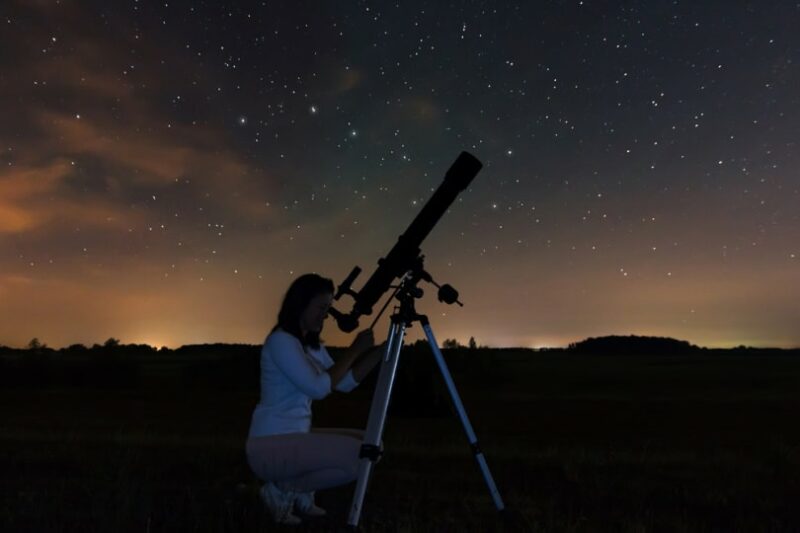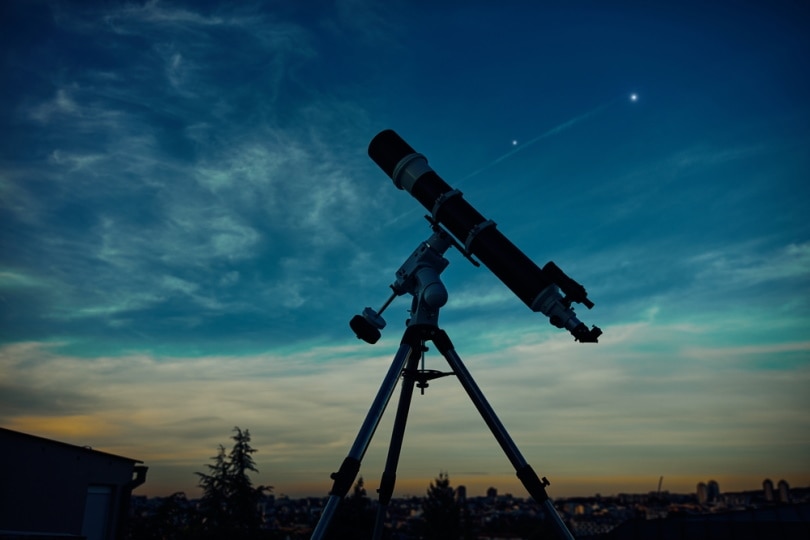Can You See Starlink Satellites? The Interesting Answer!
Last Updated on

Starlink satellites are a group of small internet-providing satellites from the Space Exploration Technologies Corporation or SpaceX. Many people claim to see these satellites from the ground as they pass overhead at night, causing new stargazers to question if that’s true. It is indeed possible to see Starlink satellites, so keep reading as we explain where and when to look and even how to predict their arrival.

What Is a Starlink Satellite?
The Starlink satellites deployed by SpaceX provide internet for more than 40 countries, and the corporation hopes to expand to provide internet access to the entire world by 2023. The satellites have a flat panel design that costs less and enables them to be packed more densely during liftoff into space. The satellites stay in low orbit to provide faster communication with the surface. Most satellites are between 200 miles and 350 miles above the ground, just slightly higher than the International Space Station, which orbits the earth at an altitude of 205 miles.
Who Deploys the Starlink Satellites?
SpaceX is a space exploration technologies company that Tesla CEO Elon Musk founded in 2002. It created several rockets, including the Falcon 1 and Falcon 9, and was the first to land a spent first-stage rocket so they could reuse it, saving millions of dollars on each launch.

When Did SpaceX Launch the Starlink Satellites?
SpaceX launched the first 60 Starlink satellites in May 2019. Today, there are more than 2,200 satellites in orbit. When complete, SpaceX expects there to be about 42,000 satellites orbiting the earth in a mega-constellation.
Can I Use Starlink Satellites?
You can sign up for Starlink internet service the same way that you sign up for service from any internet provider, by contacting the company to see if it is available in your area. Many people in the United States can get service, with those in the northern latitudes having better luck. SpaceX expects to provide much better coverage as more satellites are launched into position. Once you subscribe to the service, you will receive a router and other components that you will use to connect to the satellites and get your new internet. Since March 2022, more than 400,000 people around the world get their internet from Starlink satellites.

How Can I See the Starlink Satellite Constellation?
Viewing the Starlink satellite constellation is easy from the ground if you have a clear night. It’s also bright, so you won’t need a telescope or binoculars. However, downloading a satellite tracker app to your smartphone will make it much easier to decipher when the satellites are overhead. The app will even enable you to predict their occurrence. Once you have the app installed and learn how to use it, look up when the app tells you to, and you will see the Starlink constellation moving overhead. You can also use this web-based Starlink tracker, which works well but isn’t as convenient as a smartphone.
What Does the Starlink Satellite Constellation Look Like?
The Starlink satellite constellation looks like a long string of stars moving through the night sky. Since it’s only a few years old, it can be quite shocking when you first see it, and it causes many people to report a UFO sighting. Once you see it for the first time, it will be easy to spot again in the future.

How Often Can I See the Starlink Satellite Constellation?
You can technically see the Starlink constellation every 90 minutes, but if it gets too close to the horizon, clouds develop, or there is too much ambient light, it can be difficult to spot it, so most stargazers are lucky to see it more than once or twice per day.
How Long Do Starlink Satellites Stay In Orbit?
Once deployed, a Starlink satellite will stay in orbit for about 5 years before it burns up in the atmosphere. As the satellites fall, SpaceX will need to replace them, or users might start to lose service. Another thing that can affect the satellites is a solar storm. A large storm in February 2022 caused many satellites to malfunction and fall to earth, causing the company to lose up to 40 satellites.
What Is the Downside to Starlink Satellites?
The primary downside of the Starlink satellites is that they are bright, and since they are in low orbit, they can easily block out other objects that people are trying to see. As a result, many astronomers and stargazers are against putting more objects into orbit, especially bright ones like the Starlink satellites. Although the internet service that they provide is essential in some parts of the world, many people are worried that such satellites will eventually enable companies to block the sky entirely.


Final Thoughts
You can see the Starlink satellites easily from the ground if you look up on a clear night at the right time. You will see a long string of what looks like stars, moving surprisingly quickly through the sky without changing shape. If they are overhead, you will likely see them again every 90 minutes as long as the sky stays clear. The satellites provide internet service to customers around the world, and many people could not receive it otherwise. As SpaceX increases the number of satellites in orbit, its service will improve and be available to more people.
Featured Image Credit: PHOTOCREO Michal Bednarek,
Table of Contents
- What Is a Starlink Satellite?
- Who Deploys the Starlink Satellites?
- When Did SpaceX Launch the Starlink Satellites?
- Can I Use Starlink Satellites?
- How Can I See the Starlink Satellite Constellation?
- What Does the Starlink Satellite Constellation Look Like?
- How Often Can I See the Starlink Satellite Constellation?
- How Long Do Starlink Satellites Stay In Orbit?
- What Is the Downside to Starlink Satellites?
- Final Thoughts
About the Author Ed Malaker
Ed Malaker is a veteran writer who contributes to a wide range of blogs covering information on computer programming, pets, birding, tools, fitness, guitars, and optics. Outside of writing, Ed is often found working in the garden or performing DIY projects in the house. Ed is also a musician, spending his time composing music for independent films or helping people repair their guitars.
Related Articles:
Can You Use Binoculars to Look At Stars? How to Choose the Right Pair
15 Crucial Facts About Ultraviolet Rays & the Sun
What Constellation Is Spica In? The Interesting Answer!
10 Interesting Leo Constellation Facts, Myths, and FAQs
15 Interesting Pegasus Constellation Facts, Myths, and FAQs
6 Interesting Sagittarius Constellation Facts, Myths, and FAQs in 2024!
What Are Constellations? Where Did They Come From?
8 Interesting Libra Constellation Facts, Myths, and FAQs
